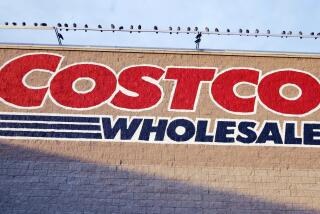Loyalty Cards Ring Up Profit, Privacy Questions
- Share via
NEW YORK — Just swipe the card at the checkout register and get a discount on tomatoes or toothpaste or whatever the specials are. You save money, and the store builds a record that lets it know how to serve its best customers.
Loyalty cards have been around for a few years now, and supermarket and drugstore chains such as CVS and Winn-Dixie are beginning to reap the benefits.
With a massive amount of data being collected on shoppers, from the types of soda they buy to whether they like to shop late at night, merchants are getting smarter at tracking consumer trends. And they’re changing their merchandise, store layout and advertising accordingly to keep their most loyal customers spending.
A few examples:
* CVS Corp. launched its loyalty card program in February 2001 and discovered that cosmetic buyers are its best customers. So beauty products have been put up front in a third of the stores.
* Food Lion, a division of Belgian food retailer Delhaize, started offering loyalty cards in 1995 and now is stocking up on peppers, cactus leaves and plantains in its Charlotte, N.C., stores to better serve customers from the Caribbean.
* Winn-Dixie Stores Inc., which rolled out a loyalty card program in March 2002, can now measure the effect of ads on top customers and knows the 25 items that attract the most loyal shoppers.
Although stores insist that these cards -- now embraced by almost half the supermarket chains -- only help keep loyal customers satisfied by having the right products at the prices they want, some privacy advocates contend that there’s a dark side.
Every time consumers swipe, they say, they give up their privacy.
“They’re not saving devices, but data-collection devices,” said Katherine Albrecht, director and founder of Consumers Against Supermarket Privacy Invasion and Numbering, a consumer privacy advocacy group.
Larry Ponemon, founder of a Tucson, Ariz.-based privacy research institute bearing his surname, said stores already are selling information to diet centers, manufacturers and marketing companies, though he declined to give names. Executives at Food Lion, Winn-Dixie, CVS and other big chains deny that they sell the information.
The supermarket industry stands to benefit the most from loyalty cards because consumers shop there an average of 2.2 times a week, but convenience and apparel stores are among other retailers embracing them.
By swiping these cards at the register, consumers are able to get the weekly discounts advertised on certain products. In many cases, customers can get a card without giving their names or addresses, but they won’t be mailed coupons for extra discounts, customized according to their buying habits.
Retailers estimate that 20% of their shoppers account for 80% of store sales, so finding out what their best customers want is essential. By simply scanning purchases, stores track what’s selling, but when those data are tied to loyalty cards, merchants obtain richer information on who is buying what.
Shoppers such as Kathy Posner, a 49-year-old Chicago resident, freely give stores such as CVS and Walgreen’s their names and home addresses to get all the extra coupons in the mail.
“I like that my purchases at a supermarket or drugstore are tracked because that ensures that the store stocks the items I like,” she said.
But Suzanne Grant, a 36-year-old Plano, Texas, resident, said she resented having to “give away personal information in order to get the best deals everywhere.”
In fact, she gives out bogus information, including a false name and address, when filling out an application.
Stores said they were seeing increased spending among their top consumers as they learn to better personalize the data, though executives declined to disclose details.
CVS reported a “pronounced” increase in spending among its customers who are active in the loyalty card program, according to company spokesman Todd Andrews. The drugstore has about 34 million cardholders, about half its customer base, and Andrews said more than half of purchases were made using the loyalty card.
More to Read
Inside the business of entertainment
The Wide Shot brings you news, analysis and insights on everything from streaming wars to production — and what it all means for the future.
You may occasionally receive promotional content from the Los Angeles Times.










